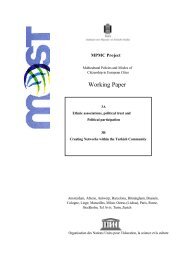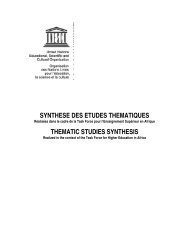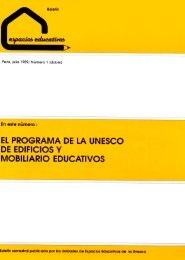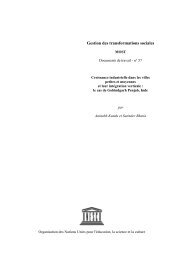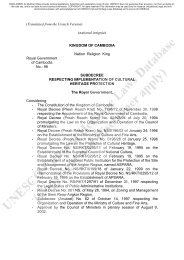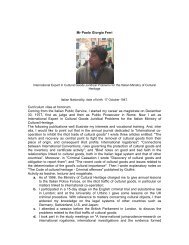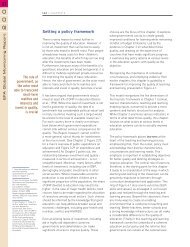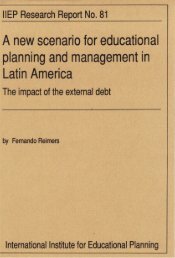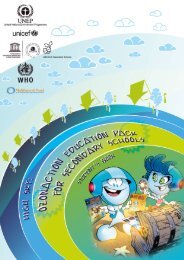Chapter 2. Progress towards the EFA goals - Unesco
Chapter 2. Progress towards the EFA goals - Unesco
Chapter 2. Progress towards the EFA goals - Unesco
You also want an ePaper? Increase the reach of your titles
YUMPU automatically turns print PDFs into web optimized ePapers that Google loves.
0<br />
1<br />
2<br />
0<br />
CHAPTER 2<br />
Education for All Global Monitoring Report<br />
The core purpose<br />
of education is to<br />
ensure that<br />
children acquire<br />
<strong>the</strong> skills that<br />
shape <strong>the</strong>ir<br />
future life<br />
chances<br />
The quality of education<br />
Goal 6: Improving all aspects of <strong>the</strong> quality of<br />
education and ensuring excellence of all so that<br />
recognized and measurable learning outcomes<br />
are achieved by all, especially in literacy,<br />
numeracy and essential life skills.<br />
The core task of any education system is to<br />
equip young people with <strong>the</strong> skills <strong>the</strong>y need to<br />
participate in social, economic and political life.<br />
Getting children into primary school, through <strong>the</strong>ir<br />
early grades and into secondary school is not an<br />
end in itself but a means of delivering <strong>the</strong>se skills.<br />
Success or failure in achieving education for all<br />
hinges critically not just on countries delivering<br />
more years in school; <strong>the</strong> ultimate measure lies<br />
in what children learn and <strong>the</strong> quality of <strong>the</strong>ir<br />
education experience.<br />
Many countries are failing <strong>the</strong> quality test. Outof-school<br />
children face obvious disadvantages,<br />
yet less attention has been paid to <strong>the</strong> fact that<br />
millions of children emerge from primary school<br />
each year without having acquired basic literacy<br />
and numeracy skills. Unable to formulate or read<br />
a simple sentence, <strong>the</strong>se children are ill equipped<br />
to make <strong>the</strong> transition to secondary school – let<br />
alone enter employment markets. The problems<br />
extend to secondary schools, where many children<br />
– sometimes a majority – do not reach even a<br />
minimal level of competence.<br />
Policy-makers, educators and parents need to<br />
focus far more on <strong>the</strong> core purpose of education:<br />
ensuring that children acquire <strong>the</strong> skills that<br />
shape <strong>the</strong>ir future life chances. That goal is<br />
difficult to achieve – far more difficult, arguably,<br />
than getting children into school. Governments<br />
need to revise approaches to teaching, learning<br />
and curriculum development. With <strong>the</strong> global<br />
financial crisis having tightened already severe<br />
budget constraints, cost is often a barrier, but<br />
learning achievement can be greatly improved<br />
at low cost, in some cases by making better use<br />
of resources already being invested in education.<br />
Public concern over <strong>the</strong> quality of education<br />
is evident in many of <strong>the</strong> world’s richest nations,<br />
as well as <strong>the</strong> poorest. This section focuses on<br />
<strong>the</strong> situation in developing countries. There are<br />
three key messages:<br />
While global gaps in access to school may be<br />
narrowing, gaps in school quality remain<br />
enormous. Evidence from learning achievement<br />
tests suggests that, in many developing countries,<br />
average students are performing close to or below<br />
minimum competency levels. Global disparities<br />
are reinforced by inequalities within countries. The<br />
problem is not just one of relative performance;<br />
absolute levels of learning achievement are<br />
exceptionally low in many countries.<br />
Getting <strong>the</strong> basics right is important – and many<br />
countries are failing to build strong foundations.<br />
Children in <strong>the</strong> early grades are not mastering<br />
<strong>the</strong> reading skills necessary for fur<strong>the</strong>r learning.<br />
Without <strong>the</strong>se foundations, returns on <strong>the</strong> huge<br />
investment that governments and households<br />
make in education will be sub-optimal. Reading<br />
skills can be improved relatively easily. Education<br />
ministries and teachers need to renew <strong>the</strong>ir<br />
efforts regarding <strong>the</strong>se basic skills.<br />
Children do not start <strong>the</strong>ir schooling on an<br />
equal footing: more must be done to equalize<br />
opportunity. Circumstances beyond children’s<br />
control, such as <strong>the</strong> income and education of<br />
<strong>the</strong>ir parents, <strong>the</strong> language <strong>the</strong>y speak and where<br />
<strong>the</strong>y live, influence <strong>the</strong>ir achievement at school.<br />
If <strong>the</strong> quality goal is to be achieved, ensuring that<br />
all learners, regardless of background, achieve<br />
basic levels of learning needs to become<br />
a central objective. Programmes to improve<br />
achievement for <strong>the</strong> most disadvantaged<br />
learners are necessary.<br />
The section is divided into three parts. Part 1<br />
highlights <strong>the</strong> large disparities in learning<br />
achievement among and within countries. Part 2<br />
explores early grade reading – one of <strong>the</strong><br />
foundations for learning. Part 3 looks at <strong>the</strong> wider<br />
challenge of improving learning in schools and at<br />
global trends in teacher recruitment.<br />
The learning gap —<br />
from global to local<br />
In an increasingly knowledge-based world,<br />
prosperity, employment and poverty reduction –<br />
for countries and individuals – depend increasingly<br />
on skills and capabilities delivered in <strong>the</strong> classroom.<br />
For large parts of <strong>the</strong> world’s population, however,<br />
education systems fall far short of legitimate<br />
expectations. Poor quality in education is<br />
jeopardizing <strong>the</strong> future of millions of young people,<br />
many of whom face <strong>the</strong> prospect of lifelong illiteracy.<br />
104



